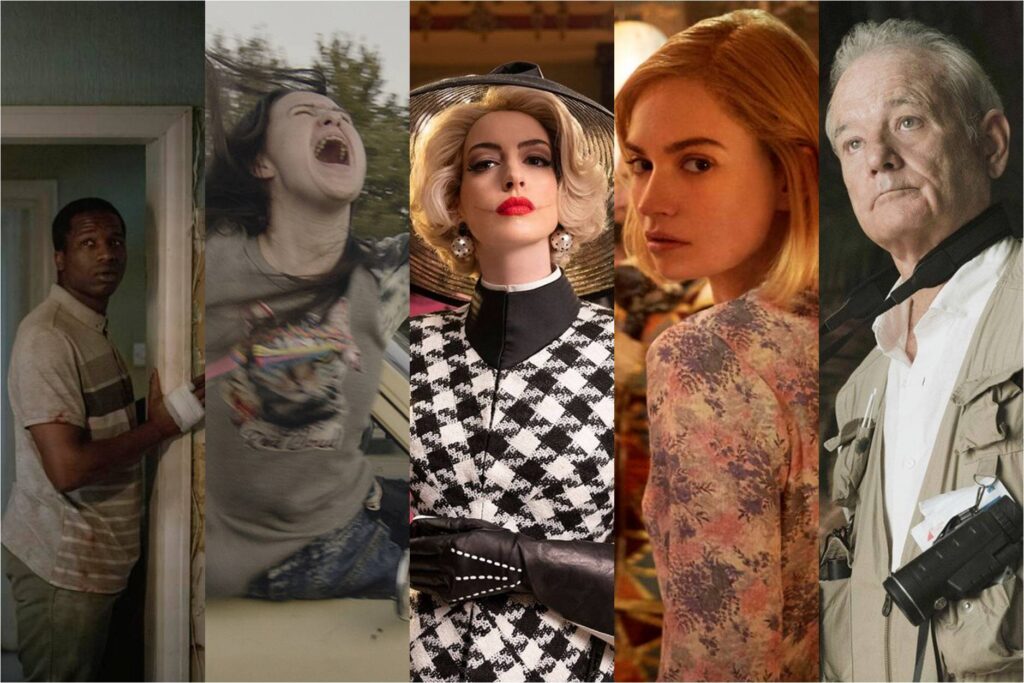
Not long ago, the United States was rocked by a seismic event—one that historians will be grappling with for generations, and one that threatens to further divide an already polarized nation. I’m talking, of course, about the new Sofia Coppola movie.
OK, OK, settle down. The 2020 presidential election may be unprecedented in a variety of ways—voter turnout, disinformation campaigns, whispered implications of an outright coup—but even it couldn’t derail the movies, which keep getting made and released. We here at the Manifesto have been a bit busy of late obsessively tracking every electoral development doing important confidential work, so let’s catch up with some capsule looks at five recent streaming titles.
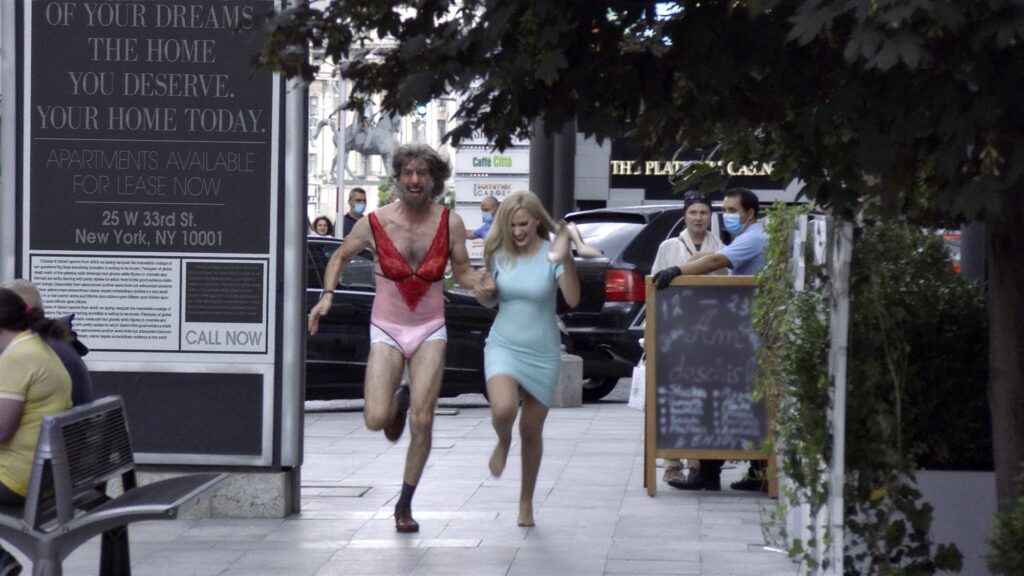
Borat Subsequent Moviefilm (Amazon). The consensus on the first Borat movie is that it’s a comic masterpiece, a perfectly mixed cocktail of scathing political commentary, inspired performance art, and unadulterated raunch. (On a recent podcast with my friends at SportsAlcohol, a colleague stated that the most uproarious laughter he’s ever witnessed in a theater came during the naked hotel fight.) I myself found Sacha Baron Cohen’s exploits commendable but not enjoyable; the occasional moments where he exposed America’s bigotry and rot seemed drowned out by lazy caricatures and cruel mockery.
To his credit, Baron Cohen has tweaked the formula for the sequel, partly out of necessity; Borat has become such a recognizable figure, the comedian couldn’t hope to dupe marks so easily once again, so he’s resorted to disguising himself in a variety of unflattering alter egos. Baron Cohen’s vocal and physical dexterity remain impressive, as does his rigorous commitment; whatever your thoughts on his methods, you can’t accuse him of going halfway. That said, most of Borat 2’s exploits feel oddly watered down, less explosive than awkward. Perhaps that’s because his various targets—a debutante ball, a women’s circle—don’t seem especially vile, or maybe it’s because the ugliness of the American electorate has been on such prominent display over the past four years, there isn’t much repulsiveness left to reveal.
There are two exceptions. The first involves Rudy Giuliani, and if you haven’t already heard about it, I envy your ability to stay off the internet. The second, which takes place at a crisis pregnancy center, is a masterful piece of political muckraking camouflaged as comedic strutting; it’s brilliantly executed, from the absurd setup to the unfathomable payoff.
One of the key players in that scene is Borat’s daughter, Tutar, and what salvages Borat Subsequent Moviefilm—or what at least prevents it from feeling like a pointless, diluted retread—is the performance of Maria Bakalova as Borat’s clueless offspring. A 24-year-old Bulgarian actor with just a handful of screen credits, Bakalova matches Baron Cohen’s gifts for impersonation and faux sincerity, never breaking character despite the ridiculousness of her surroundings. She also, impossibly, lends a sliver of pathos to the film, making Tutar a sympathetic, three-dimensional character rather than a pure delivery system for foul language and silly jokes. At once salty and sweet, Bakalova gives Tutar a soul, something that much of this movie—and much of this country—seems to lack. Grade: B-
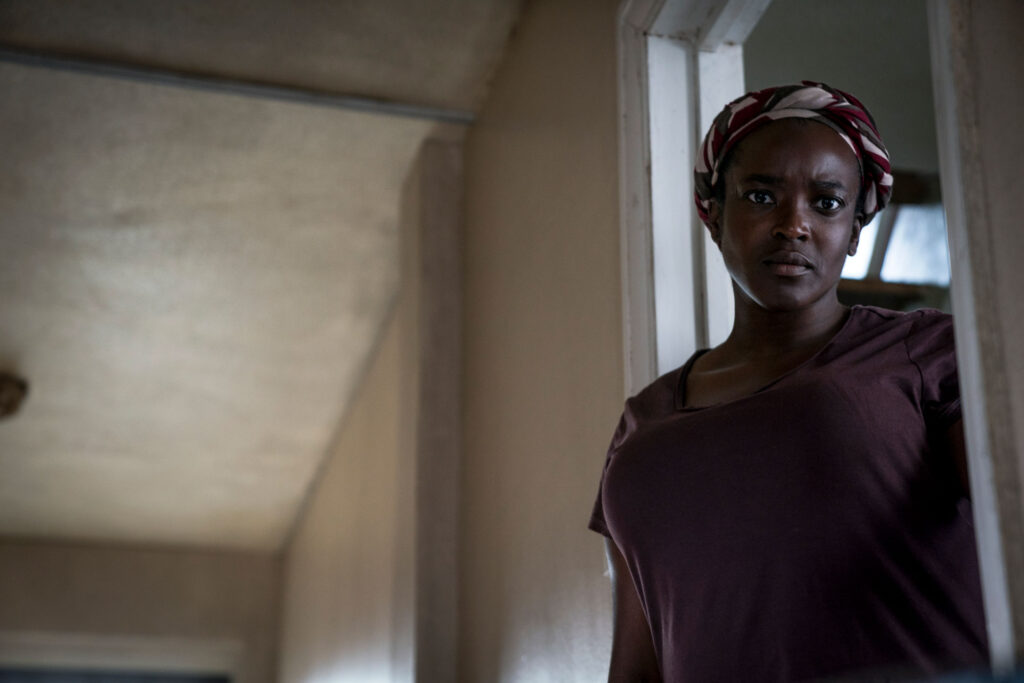
His House (Netflix). The one-bedroom tenement isn’t the only thing that’s haunted in His House, a dark and disturbing allegory of the refugee crisis. Centered on a South Sudanese couple attempting to settle in London, Remi Weekes’ feature debut is eye-opening in the way it pitilessly chronicles the daunting challenges of cultural and political assimilation: the taxing bureaucratic restrictions, the casual racism of natives, the omnipresent fear that one wrong step could lead to deportation. Wisely narrow in scope—aside from the leads, played by Sope Dirisu and Lovecraft Country’s Wunmi Mosaku, the only other character of note is Matt Smith’s semi-sympathetic administrator—His House effectively uses its small scale to make big points.
It is also a meat-and-potatoes horror movie, and not a particularly good one. Before long, the wife and husband are tormented by evil spirits lurking, often literally, within their new home’s walls. Weekes exhibits a solid grasp of the genre’s grammar, but the frequent jump scares and ghastly figures grow repetitive, diminishing their power. He does supply some striking images, most notably in a scene where the camera slowly pulls back and finds the living room floating in a dank ocean, topped by ominous red clouds. Mostly, though, the horror of His House is flat and familiar.
For its first hour, the movie struggles to reconcile its troubling message with its blunt-force execution. But in its final act, His House transforms into something more sinister and surprising, with a legitimately shocking reveal that lends considerable potency to the characters’ predicament. The film opens with a mother assuring her child that she’ll protect her. But as this movie patiently, appallingly proves, no refugee is ever really safe. Grade: B
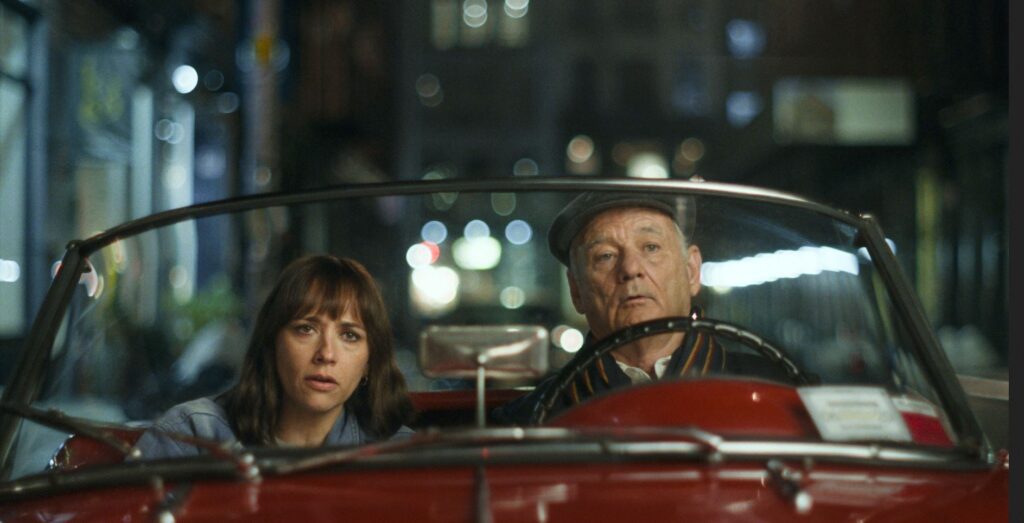
On the Rocks (Apple). 2020 wouldn’t seem to be the ideal year for a new Sofia Coppola movie. With the COVID-19 pandemic felling hundreds of thousands of Americans and infecting millions more—all while disproportionately harming communities of color—do we really need another trenchant study of privilege and its concordant agonies?
Turns out, yes. Coppola has her faults—her pacing can be overly deliberate, and her obsession with wealth and celebrity can be drudging (even if it’s often quite interesting)—but she’s a deeply empathetic filmmaker, and right now, her abiding compassion feels like a tonic. And On the Rocks is one of her best movies, a funny and tender character study that touches on a variety of universal complexities: marriage, motherhood, personal ennui, professional disenchantment, and the frustration of having an absentee father who’s way cooler than you are.
That father is played by Bill Murray, who delivers one of the finest and most winningly relaxed performances of his career. The ostensible plot of On the Rocks is irritatingly contrived: Rashida Jones’ character suspects that her husband (Marlon Wayans) is having an affair, and rather than confront him directly, she succumbs to her dad’s idea of tailing him and catching him in the act. It’s a slim reed, but it’s really just an excuse to throw Murray and Jones together, and their camaraderie is where the movie shines. It also illustrates Coppola’s evolution as a writer; the ambiguous sexual tension between Murray and Scarlett Johansson in Lost in Translation has matured into a familial connection that’s fraught with conflict of a different sort, a slippery bond that comprises devotion, resentment, and pride. It’s a beautiful partnership, and its tinges of sadness don’t mitigate its joy.
In the film’s most charming sequence, our hapless amateur gumshoes run a red light and get pulled over by the cops, only for Murray’s character to smooth-talk them out of the jam. It’s arguably tone-deaf, given how you can imagine the scene playing out if the driver were a young black man instead of a rich white dude. But the brilliance of Murray’s performance in particular, and of On the Rocks in general, lies in how it silently erases demographic distinctions and instead highlights the troubles and triumphs of its characters. Yes, they’re wealthy people with first-world problems. But their wants and fears can still mirror your own. Grade: B+

Rebecca (Netflix). Daphne du Maurier’s Rebecca is a novel about a woman who is constantly eclipsed by the looming shadow of her predecessor. Ben Wheatley’s Rebecca is the second big-screen adaptation of the book, following the 1940 Best Picture winner helmed by Alfred Hitchcock. You can do the math.
It’s tricky to judge a remake like Rebecca, since your impression of it almost certainly hinges on your familiarity with the original. For repeat viewers, it hardly seems damning to declare that Wheatley’s incarnation isn’t as good as Hitchcock’s classic; the real question is the breadth of the gap. If you’ve never seen the original, you might find much to like in this polished, pleasant film—a sweeping melodrama of romance, intrigue, and murder—even if you’re unlikely to deem it remotely memorable.
Evaluated on its own terms, this new Rebecca is, well, fine. The actors may not possess the heft of their precursors (whoops, there I go again), but they’re still accomplished performers; Lily James is convincingly scared as the timid bride brought to the fearsome estate of Manderley by her stern new husband, who’s played with suitable imperiousness by Armie Hammer. Even better is Kristin Scott Thomas as Danvers, the icy housekeeper; early on, Hammer’s Maxim de Winter (what a name!) informs his wife that Danvers “runs the house,” and Scott Thomas, with her rigid composure and steely glare, gives you no reason to disbelieve him. The cast’s collective pantomime of anger and terror unfolds amid an arresting environment, featuring a glossy production design and sumptuous costumes.
It’s all perfectly acceptable. What is missing—and here I find myself, despite my best efforts, returning to the Hitchcock comparison—is a true sense of menace, of desire, of emotional violence. (Scott Thomas’ performance is the exception in part for her ability to convey genuine cruelty.) Wheatley, whose Free Fire is one of the more entertaining recent shoot-’em-ups, is not among my favorite directors, but his movies (Kill List, High-Rise) typically unfold with a peculiar angularity; here, he seems to be aiming for respectability, a process that appears to have involved him studiously draining his filmmaking of all distinction. His Rebecca is quite pretty, and also pretty slight.
Well, what did you expect? There’s no beating Hitchcock at his own game; if you’re going to remake him, you need to tweak the mood, shift the setting, enliven the proceeding somehow. Yet this Rebecca is so structurally similar to the original that it’s fair to question why it exists at all, operating as little more than a pale imitation. That’s why its defining figure isn’t James or Hammer but Sam Riley, who delivers a tepid performance as de Winter’s stealthy rival. Riley is a competent enough actor, but he quails next to his forebear; indeed, what truly haunts this genteel Manderley isn’t a dead wife, but the towering ghost of George Sanders. Grade: C+
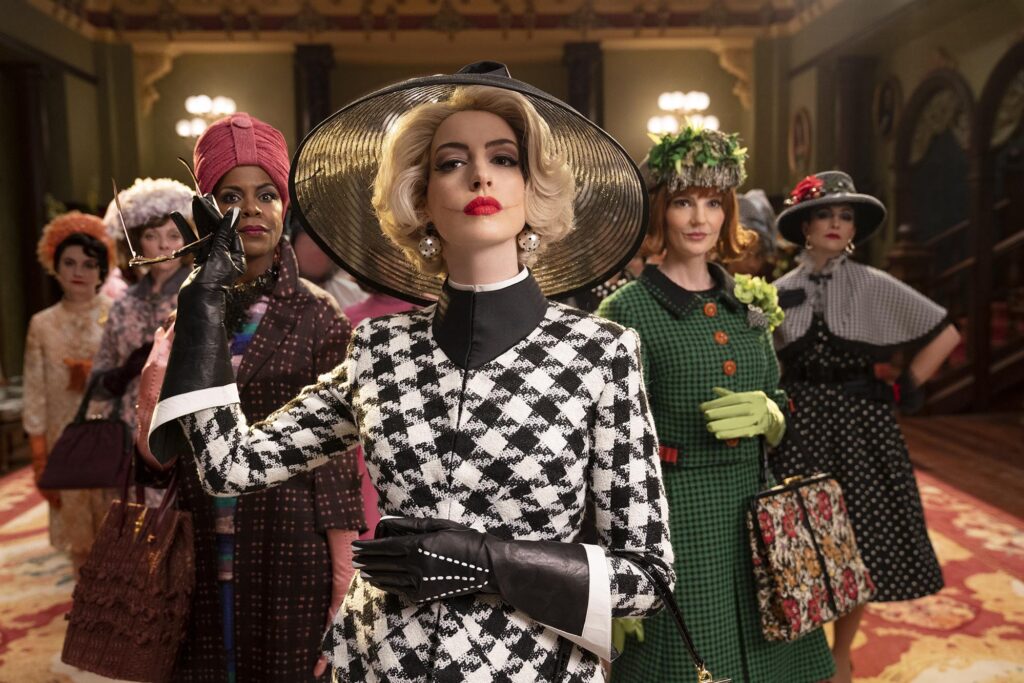
The Witches (HBO). Speaking of unnecessary remakes! But honestly, Nicolas Roeg’s 1990 adaptation of Roald Dahl’s beloved novel wasn’t the worst candidate for an update; watching it for the first time last month (sue me, I skipped childhood), I found it impressively ghoulish in parts, but rather woodenly performed and lacking in genuine wonder or excitement. Three decades later, Robert Zemeckis has arrived to modernize The Witches, imprinting it with his own brand of special-effects savvy and cutesy storytelling.
Is the result another pointless retread, or a bold reimagining? Neither, really. Zemeckis has made some sensible tweaks to the source material, adding a nifty new action sequence near the end and deploying his trademark craftsmanship throughout. Some of his digital work remains frustratingly uncanny—an early scene with a snake looks laughably fake—but overall his execution is sturdy, with some fun choreography and a strong sense of scale. (There’s also a laugh-out-loud moment midway through that somehow reminded me of One Flew Over the Cuckoo’s Nest.) And Anne Hathaway, as the evil Grand High Witch, gets to vamp wildly, reminding us that she’s consistently watchable in even the silliest of fare.
Which, let’s face it, this is. In terms of plot and character, The Witches is barely worth considering; for the most part, this is a movie about talking mice and their efforts to poison some soup. That foolishness doesn’t automatically render the film worthless, but Zemeckis’ gentle approach has neutered it of any fascination beyond its technical style, which is all that seems to interest him these days. (He and his co-writers, Kenya Barris and (gasp!) Guillermo del Toro, have also attempted to graft a racial metaphor onto the skeleton of Dahl’s story, moving the action to 1968 Alabama and hinting at discrimination among the villains; it’s good that the film features Black actors in key roles, including Octavia Spencer and Chris Rock, but otherwise the stabs toward social justice feel forced and simplistic.)
Roeg’s version of The Witches is said to have scarred a generation of kids for life. Zemeckis’ remake, which is cheerful but sanded down, is unlikely to do the same. At least he’s changed things up a bit—there will be no confusion about which Witches is which—but he’s also inadvertently reminded us that computerized wizardry is rarely a substitute for actual magic. Grade: C
Jeremy Beck is the editor-in-chief of MovieManifesto. He watches more movies and television than he probably should.

More please. Its a pandemic, Jeremy.
Another one will be out Friday, don’t forget to Venmo me.